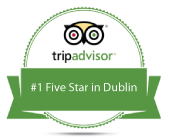Stars in a Glass: The Art of Champagne at The Merrion Hotel
Invented over 300 years ago, Champagne comes into its own come summer time.
“Come quickly, I am tasting the stars!” the Benedictine monk, Dom Pérignon is said to have exclaimed, back in 1693, having apparently perfected the art of Champagne. Whether he deserves all the credit, or even whether he made his famous utterance at all is up for debate, but the world’s favourite celebratory drink has definitely inspired some memorable utterances. Perhaps that’s no wonder, after all, the pop of champagne corks mark most of our memorable occasions.
“I drink Champagne when I win, to celebrate… And I drink Champagne when I lose, to console myself,” remarked Napoleon Bonaparte; a sentiment echoed almost 150 years later by Winston Churchill, who noted that “in success you deserve it, and in defeat you need it.” Brigitte Bardot referred to Champagne’s legendary capacities to perk a person up when she said, “Champagne is the one thing that gives me zest when I am tired,” and fellow film star, Bette Davis clearly also knew a thing or two about its restorative powers when she said, “there comes a time in every woman’s life when the only thing that helps is a glass of champagne.”

Champagne on the map
It took another Champagne legend to put it best, so raise a glass to Lily Bollinger, who described the ideal times for this toast of toasts: “I only drink Champagne when I’m happy and when I’m sad. Sometimes I drink it when I’m alone. When I have company I consider it obligatory. I trifle with it if I’m not in a hurry and drink it when I am, otherwise I never touch the stuff unless I am thirsty.”
So, next time you find yourself celebrating the fact that it’s a Wednesday, raise a glass to these and other legends, including Barbe-Nicole Ponsardin Clicquot, better known as the Veuve Clicquot who, finding herself widowed at the age of just 27, brought her wine business back from the brink of ruin in 1805. Betting all the family money on backing Champagne, she put this relatively small region of France, which encompasses just 319 villages and had been mainly known for its white wines, forever on the map.
Henriot Champagne, House Champagne to the Merrion Hotel, was officially founded just three years later in 1808, by another woman, Apolline Henriot, but the story goes back even further. The Henriot family first settled in the region in 1640, and the lands, which are perfect for growing the Chardonnay, Pinot Noir and Pinot Meunier vines used in Henriot Champagne, have remained in the same family ever since.

A passionate legacy
Now under the stewardship of Gilles de Larouzière Henriot, the 8th generation of passionate Henriot Champagne makers, the family are also actively involved in the Alliance Terroirs Project, which focus on incorporating sustainability into everything they do, promoting biodiversity and researching positive actions and impacts.
This is probably not foremost in your mind when raising your glass of delicate golden Henriot in The Merrion’s Drawing Rooms during a Champagne Afternoon Tea, on the Garden Terrace, or on a summer Champagne Picnic, which the Hotel team will be happy to arrange for you. Henriot’s delicate and balanced tasting notes include citrus fruits, white flowers and a buttery brioche nose; and, as The Merrion’s Peter MacCann explains, it was selected as the prestigious House Champagne during a blind tasting – with a difference.
“We made sure to include people who don’t like champagne,” says MacCann, who is a noted member of the Academie du Champagne, which was established in 1956, by the 12 Grand Marques Champagne Houses. He agrees that it can be difficult to find such people, but adds that of the nine drinks sampled, Henriot was the absolute preferred choice. MacCann believes fact that the Henriot is family owned and run contributes to the excellence of their Champagnes. “They have the passion,” he says. “They commit to the quality and the legacy.”

A toast to the future
It may be made with passion, by successive generations of experts, but what exactly is it that makes Champagne such a heady delight? Oscar Wilde said that “pleasure without Champagne is purely artificial,” and perhaps that’s because the bubbles actually do carry the alcohol to your brain a little faster. While other drinks catch up after a sip or two, nothing beats that sparkling rush of joy as you raise a glass to celebrate the big moments and the small. And even if things don’t look like they’re ready for celebration? Champagne is there for you too. As French poet Paul Claudel announced: “in the little moment that remains to us between the crisis and the catastrophe, we may as well drink a glass of Champagne!” Cheers.



